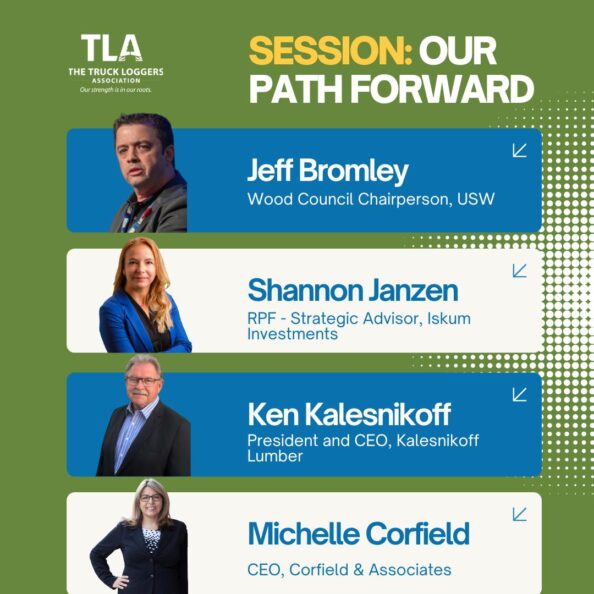 The panel discussion titled Our Path Forward at the Truck Loggers Association (TLA) Conference featured a diverse group of leaders tackling the future of BC’s forest industry. Moderated by veteran journalist Vaughn Palmer, the panel included Jeff Bromley, Chair of the United Steelworkers Wood Council; Ken Kalesnikoff, President and CEO of Kalesnikoff Lumber; Shannon Janzen, Strategic Advisor at Iskum Investments; and Dr. Michelle Corfield, CEO of Corfield & Associates. Each panelist brought unique insights to address the challenges and opportunities facing the industry.
The panel discussion titled Our Path Forward at the Truck Loggers Association (TLA) Conference featured a diverse group of leaders tackling the future of BC’s forest industry. Moderated by veteran journalist Vaughn Palmer, the panel included Jeff Bromley, Chair of the United Steelworkers Wood Council; Ken Kalesnikoff, President and CEO of Kalesnikoff Lumber; Shannon Janzen, Strategic Advisor at Iskum Investments; and Dr. Michelle Corfield, CEO of Corfield & Associates. Each panelist brought unique insights to address the challenges and opportunities facing the industry.
Advocating Unity Amid Industry Decline — Jeff Bromley delivered a sobering assessment of the industry’s current state. He highlighted the significant decline in manufacturing capacity, citing 18 mill closures during his tenure and a concerning shift toward negotiating closure agreements instead of collective bargaining. Bromley described the challenges posed by declining annual allowable cuts (AAC), exacerbated by political and regulatory hurdles such as tenure redistribution, permitting delays, and the Old Growth Strategic Review.
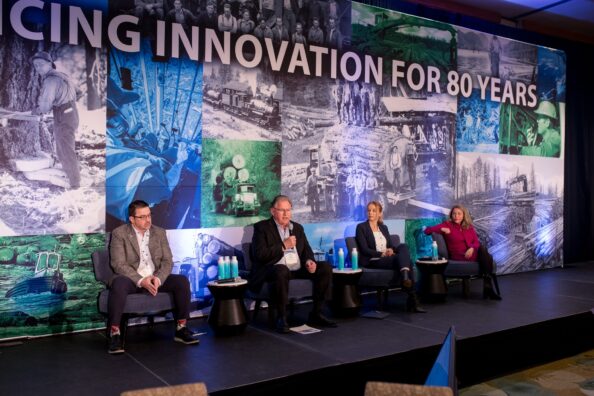
Bromley stressed the need for stronger collaboration between labor, government, and industry stakeholders. He underscored the importance of revenue-sharing models with First Nations, referencing successful frameworks from other provinces. He also emphasized the urgency of accelerating permitting processes to reduce instability and foster economic sustainability. “Desperate times call for new ideas,” he said, urging the sector to adapt with innovative strategies and bold leadership.
Reflecting on his decades of experience, Bromley shared the impact of these changes on communities and workers, noting the strain caused by an industry grappling with both environmental and economic pressures. He recounted how members of the United Steelworkers union have faced significant job losses, further emphasizing the importance of aligning policies to support workers while addressing structural challenges. He also pointed out the need to create economic opportunities that balance environmental stewardship with the livelihoods of rural communities.
Bromley highlighted the growing frustration among workers with government inaction, stating, “If I walked into a lunchroom today and said we need to support this government, I’d better have running shoes on.” He called for pragmatic leadership, stressing that a cohesive vision and clear policy framework are essential to reviving the industry. Bromley concluded by reminding attendees that the forest industry’s future depends on rebuilding trust and collaboration among all stakeholders, from policymakers to communities.
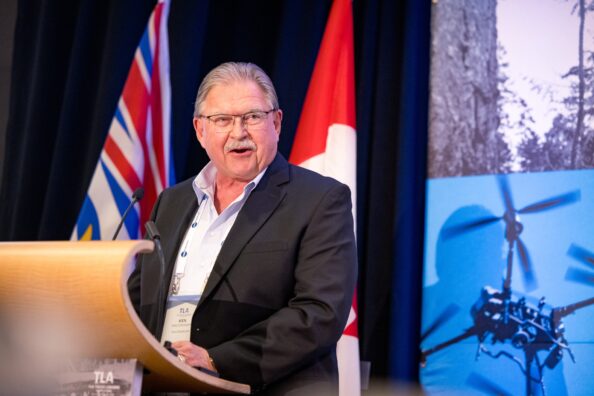 The Value-Added Visionary — Ken Kalesnikoff shared the transformative journey of his family-owned company from traditional sawmilling to becoming a leader in value-added mass timber products. He showcased recent projects, including a seismic-resistant structure in Vancouver, and discussed the company’s investment in cutting-edge technology at its Castlegar facility.
The Value-Added Visionary — Ken Kalesnikoff shared the transformative journey of his family-owned company from traditional sawmilling to becoming a leader in value-added mass timber products. He showcased recent projects, including a seismic-resistant structure in Vancouver, and discussed the company’s investment in cutting-edge technology at its Castlegar facility.
Kalesnikoff elaborated on the critical role government incentives play in making value-added production viable. He referenced examples from European countries where similar industries thrive under supportive policies. “BC can’t afford to lag behind,” he noted, emphasizing the global competition in forestry innovation. Kalesnikoff also detailed the company’s venture into modular prefabricated components, describing it as a potential game-changer for rural economies and an environmentally friendly approach to construction.
Reflecting on the company’s legacy, he shared personal anecdotes of the family’s risk-taking and dedication to sustainability, which have kept them resilient in a challenging market. “We’ve had to think differently and adapt to survive,” he said, encouraging others in the sector to embrace similar approaches. He further explained the stress involved in high-risk investments, including the decision to establish a new mass timber facility.
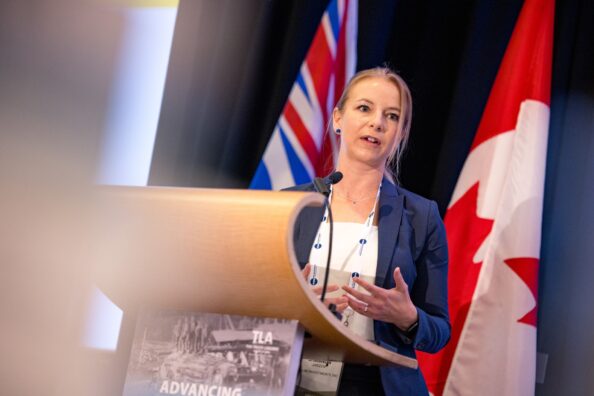 Rethinking Leadership Through Unlearning — Shannon Janzen brought a personal perspective, sharing how her work with Iskum Investments—a consortium of 21 First Nations—reshaped her views on leadership and forestry. Describing her journey as one of “unlearning,” she reflected on how traditional industry paradigms often overlook Indigenous knowledge and perspectives.
Rethinking Leadership Through Unlearning — Shannon Janzen brought a personal perspective, sharing how her work with Iskum Investments—a consortium of 21 First Nations—reshaped her views on leadership and forestry. Describing her journey as one of “unlearning,” she reflected on how traditional industry paradigms often overlook Indigenous knowledge and perspectives.
Janzen emphasized the importance of listening to Indigenous voices and adopting collaborative approaches rooted in respect and equity. She recounted the impactful statement from Chief Ken Watts: “Nothing about us without us,” which serves as a guiding principle for reconciliation and inclusive decision-making. She advocated for industry professionals to engage in cross-cultural training, develop meaningful partnerships with First Nations, and broaden their perspectives to achieve shared success.
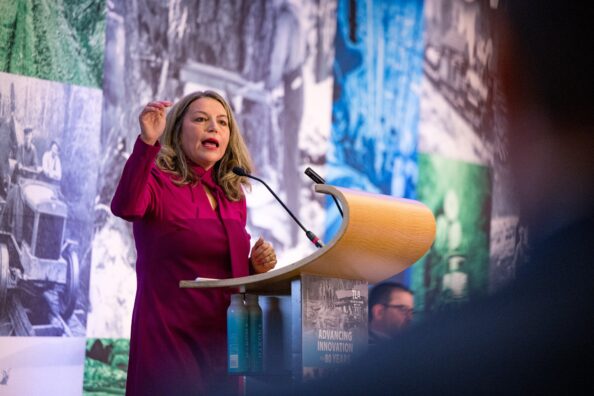 Breaking Down Barriers — Dr. Michelle Corfield delivered a compelling call to action, challenging attendees to confront systemic barriers limiting Indigenous participation in forestry. Drawing on her experience, Corfield outlined legislative and financial obstacles, such as limited access to capital and restrictive policies under the Indian Act, that hinder First Nations entrepreneurs and communities.
Breaking Down Barriers — Dr. Michelle Corfield delivered a compelling call to action, challenging attendees to confront systemic barriers limiting Indigenous participation in forestry. Drawing on her experience, Corfield outlined legislative and financial obstacles, such as limited access to capital and restrictive policies under the Indian Act, that hinder First Nations entrepreneurs and communities.
She proposed reforms including equitable revenue-sharing models, enhanced access to capital, and increased representation of Indigenous voices on corporate boards and in trade negotiations. Corfield also highlighted the successes of Iskum Investments as an example of First Nations collaborating to retain economic benefits within BC. “When First Nations bring their voices to the table, they bring centuries of wisdom and a commitment to stewardship,” she asserted. Corfield concluded with a reminder of the deep cultural and historical connection Indigenous communities have with the land, emphasizing the need for reconciliation efforts to translate into actionable change.
The panel highlighted the intricate challenges and opportunities within BC’s forest industry. Bromley’s emphasis on collaboration, Kalesnikoff’s focus on sustainability and value-added products, Janzen’s advocacy for inclusive leadership, and Corfield’s push for systemic reform collectively provided a roadmap for renewal. Palmer closed the session by commending the panel’s insights, stating, “This was one of the most stimulating panels I’ve witnessed, offering real insights into how we can navigate these turbulent times.”
Drafted with the assistance of digital tools to streamline the process.